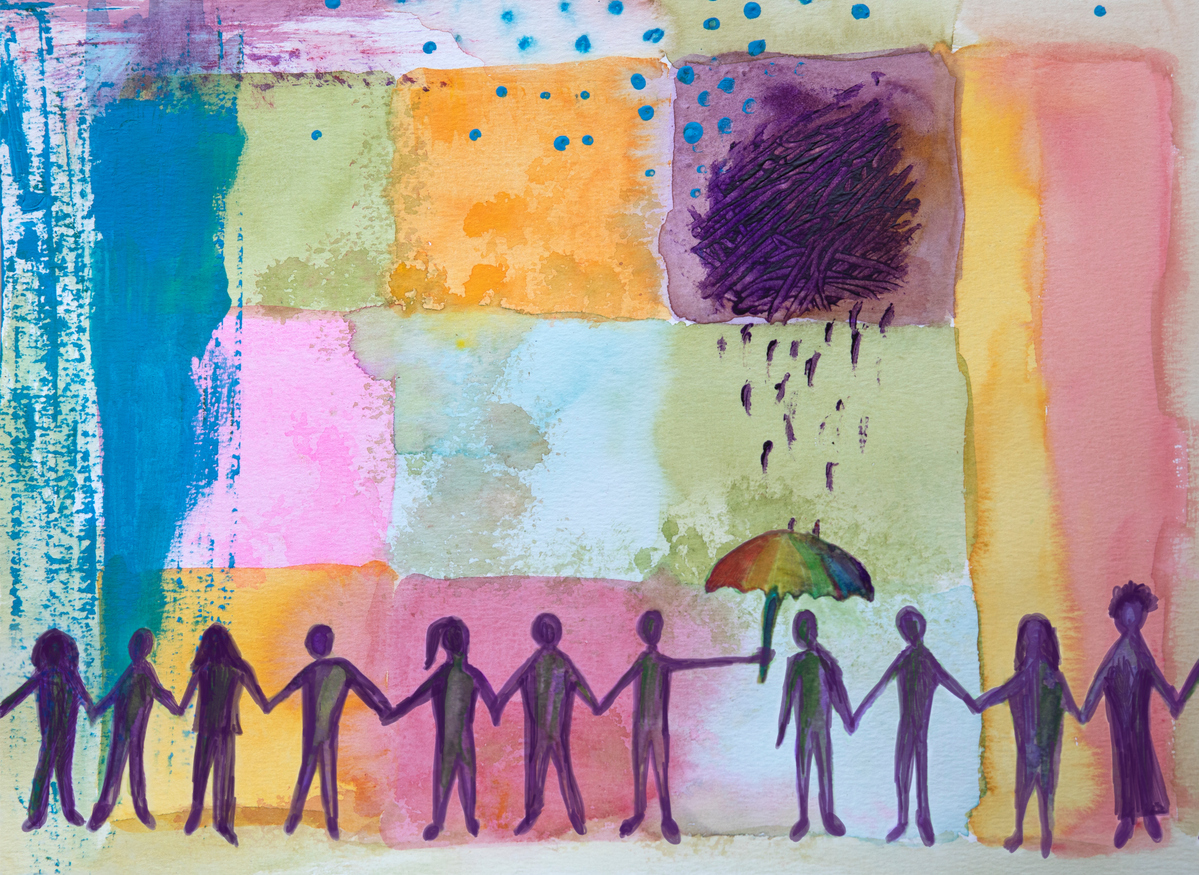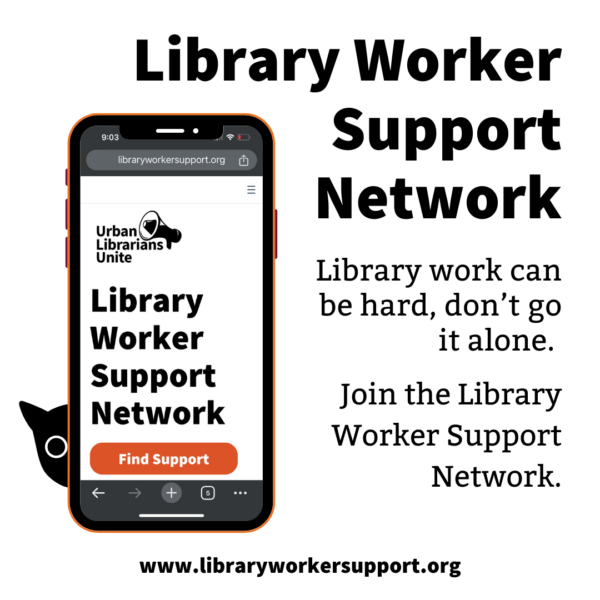The Library Workers Support Group: A Response to Workplace Trauma

Library workers, including librarians, facilities staff, and security personnel, face unique challenges in their daily roles, such as issues related to secondary trauma, abuse, and harassment. These often-overlooked problems underscore the need for a deeper understanding of their impact on library staff. Leah Dudak, a research assistant for Urban Librarians Unite, shared how these experiences inspired the development of a study that ultimately led to the establishment of the Library Workers Support Group. This group serves as a vital resource to address the growing need for support within the profession.
The Library Workers Support Group focuses on the effects of secondary trauma, abuse, and harassment on library staff, leading Lauren Comito, Executive Director of Urban Librarians Unite, to launch the 2022 Urban Library Trauma Study. The Substance Abuse and Mental Health Services Administration (2024) defines trauma as events causing physical or emotional harm with lasting effects on overall well-being. Secondary traumatic stress, as noted by the National Child Traumatic Stress Network’s Secondary Traumatic Stress Committee (2011), occurs when an individual learns about another’s trauma, leading to PTSD symptoms from indirect exposure. These symptoms include hypervigilance, hopelessness, avoidance of clients, and chronic exhaustion (National Child Traumatic Stress Network, 2011) (Center for Advanced Study in Child Welfare, 2012)(Becker & McCrillis, 2015 (Jordan, 2014)(Mele, 2016)(Ford, 2019). A 2024 New York Times article highlighted library incidents, including over 170 incident reports by Mychal Threets at the Fairfield Civic Center Library (Solano CA), documenting patron-related violence and harassment (Caron, 2024). This awareness underscored the need for the 2022 Urban Library Trauma Study
The 2022 Urban Library Trauma Study aimed to quantify library workers’ traumatic experiences and find ways to address them. Central to this is the Library Trauma Cycle, which includes three stages: outside stressor, professional community response, and internationalization (Urban Librarians Unite, 2022). The Outside stressor is adverse events for library staff, including harassment, abuse, bullying, violence, health incidents, and secondary trauma from unmet patron needs. Professional community response is the response or lack of response from your coworkers, supervisor, administration, and professional community. Internalization happens when, without support, many library workers begin to feel as though the events are their fault or that they are alone in their experiences. They then hold on to the stress and bring it into their next patron or coworker interaction (Urban Libraries Unite 2022). In response to this cycle, several solutions were developed to address these challenges, including creating the Library Workers Support Group.
 The Library Workers Support Group was formed following recommendations from the 2022 Urban Library Trauma Study. The Urban Librarians Unite organization applied for a grant from the Institute of Museum and Library Services to prototype a support network launched in September 2024, with 80 participants signed up across six monthly groups. They are addressing challenges as they arise to ensure success for all involved (Staver, 2024). Self-care became an overprescribed fix during the pandemic. Trauma-informed care is not sustainable unless library workers care for themselves first (Dudak 2023). Trauma-informed librarianship has helped build awareness of – and compassion for – what patrons experience, but it doesn’t necessarily address what library employees are going through (Peet 2022). As more libraries bring social workers on staff, these new trauma-informed approaches are changing policies and protocols that affect patrons and those involving staff (Ford 2019).
The Library Workers Support Group was formed following recommendations from the 2022 Urban Library Trauma Study. The Urban Librarians Unite organization applied for a grant from the Institute of Museum and Library Services to prototype a support network launched in September 2024, with 80 participants signed up across six monthly groups. They are addressing challenges as they arise to ensure success for all involved (Staver, 2024). Self-care became an overprescribed fix during the pandemic. Trauma-informed care is not sustainable unless library workers care for themselves first (Dudak 2023). Trauma-informed librarianship has helped build awareness of – and compassion for – what patrons experience, but it doesn’t necessarily address what library employees are going through (Peet 2022). As more libraries bring social workers on staff, these new trauma-informed approaches are changing policies and protocols that affect patrons and those involving staff (Ford 2019).
The Library Workers Support Group offers a variety of peer support services for library staff, including specialized support groups held throughout the month; the Manager Support Group meets on the first Tuesday at 3:00 PM EST, the Queer Library Workers Support Group on the second Thursday at 5:00 PM EST, and the Black Library Workers Support Group on the fourth Wednesday at 1:00 PM EST. Schedule is subject to change based on holidays and volunteer availability. All times indicated are Eastern Standard Time.
By promoting a trauma-informed environment and fostering open dialogue, the Library Workers Support Group strives to empower library workers, enhance their well-being, and ultimately create safer, healthier library environments for staff and patrons—workers, not medical professionals. Currently, 15 trained Peer Support Specialists are leading these support groups, organized into five teams: Ethics, Logistics, Communications, Training and Documentation, and Self-Care. Urban Libraries Unite also provides a Peer Leader Wellness Journal supported by staff, including a member with a Master’s in Social Work (MSW) degree. This journal serves as a helpful resource. This is not medical advice. The support groups offer peer support and are not operated by medical professionals (Dudak, 2024).
To join, prospective members must complete a five-page Library Worker Support Network Intake Form and upload a photo of themselves holding their staff ID to verify their status. After completing the form and verifying it, you will receive an email regarding registration for a support group meeting. You must register to obtain the Zoom link.
In conclusion, the establishment of the Library Workers Support Group marks a significant step toward addressing the complex challenges faced by library staff, including secondary trauma, abuse, and harassment. The findings from the 2022 Urban Library Trauma Study underscore the urgent need for support and understanding within the profession. By recognizing the profound impact of these experiences on mental health and workplace dynamics, the support group aims to create a safe space for library workers to share their experiences while fostering a sense of community. As this initiative continues to grow, it has the potential to empower library staff, enhance their well-being, and ultimately lead to a more supportive and resilient library environment. Through collaboration and ongoing dialogue, the library community can work together to mitigate trauma and promote a healthier professional landscape for all library workers.
REFERENCES
Becker, R. W., & McCrillis, A. (2015). Health sciences librarians, patient contact, and secondary traumatic stress. Journal of the Medical Library Association : JMLA, 103(2), 87–90. https://doi.org/10.3163/1536-5050.103.2.006
Caron, C. (2024). Librarians face a crisis of violence and abuse. New York: New York Times Company. Retrieved from http://ezproxy.nypl.org/login?url=https://www.proquest.com/blogs-podcasts-websites/librarians-face-crisis-violence-abuse/docview/3122446518/se-2
Center for Advanced Studies in Child Welfare. (2012). Secondary trauma and the child
Welfare workforce.http://cascw.umn.edu/wp-content/uploads/2013/12/CW360_2012.pdf
Dudak, L. (2024). Phone interview on the Library Workers Support Group. Conducted by Carolyn Lawrence, December 3, 2024.
Dudak, L. (2023, February 14). Working toward wellness: Exploring trauma-informed librarianship. Library Journal. Retrieved November 30, 2024, from Working Toward Wellness: Exploring Trauma-Informed Librarianship | Library Journal
Ford, A. (2019, June 3). Toward a Trauma-Informed Model: Learn to ask “What happened?” – not “What’s wrong?”. American Libraries. Toward a Trauma-Informed Model | American Libraries Magazine
Mele, C. (2016, Dec 8). Libraries become unexpected sites of hate crimes. The New York Times.https://www.nytimes.com/2016/12/08/us/libraries-hate-crimes.html?searchResultPosition=1
National Child Traumatic Stress Network, Secondary Traumatic Stress Committee. (2011). Secondary Traumatic Stress: A fact sheet for child-serving professionals. National Center for Child Traumatic Stress. secondary_traumatic_tress.pdf
Peet, L. (2022, July 5). Tackling Trauma in Frontline Workers. Library Journal. Retrieved November 30, 2024, from Tackling Trauma in Frontline Workers | Library Journal
Substance Abuse and Mental Health Services Administration. (2024, May 29). Trauma and Violence. SAMHSA. Trauma and Violence – What is Trauma and the Effects? | SAMHSA
Staver, A. (Host). (2024, November 13). Libraries serving as centers for addressing social problems [Audio podcast episode]. In L. Comito (Executive director), C. Barnard (Information services specialist), & C. Hansen (Chief customer experience officer). All Sides. WOSU. Libraries serving as centers for addressing social problems | WOSU Public Media
Urban Librarians Unite. (n.d.) Urban Librarians Unite: Library Workers Support. Urban Librarians Unite. Urban Library Trauma Study – Urban Librarians Unite
Tags: 2022urbanlibrarytraumastudy, librarycareer, librarycareerburnout, libraryworkerssupportgroup, urbanlibrariesunite









